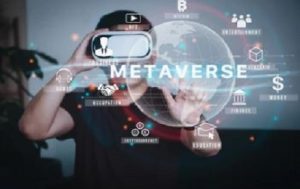Asml Inc is a leading technology company focused on innovation and creating and monetizing its…
Understanding Metaverse and Law: Challenges and Solutions
Introduction
Robert J Thieruf in his book “Virtual Reality Systems for Business” explains Virtual reality technology of transforming worlds. “Virtual reality” typically consists of three elements. A computer system that allows the user to interact with the virtual world itself; a computer-generated 3-D visual or visual environment that was either produced from scratch or inspired by a simulation of the real world; and the user’s interaction with the virtual world in real-time”.[1]
Virtual reality (VR) is primarily a technology that lets users experience it through a headset or other devices by which users can access the Metaverse, a shared virtual area or a virtual environment where people in the form of Avatars can perform a range of activities, including gaming, socializing, and commercial dealings, without having to physically do those things, using a variety of device platforms.
The term “Avatar” here indicates a user’s graphical representation or their identity or digital account they use to enter the Metaverse. They may manifest as inanimate objects, animals, or even people. As this immersive environments have become more popular, the avatar is now recognized as someone with “agency” more than just a visual representation, but it lacks agency since avatars respond to initial actions like moving hands on a joystick in a directed manner. However, in social contexts like chat rooms or the online virtual community it is referred as “Second Life” where users commonly refer their avatar as “me” instead of “my agent.”
This concept of metaverse was purely a science fiction, firstly introduced by author Neal Stephenson in his 1992 novel ‘Snow Crash’, Recent advancements in cutting-edge technology that made it more realistic, creating a ‘Parallel World’. The emergence of metaverses, or Artificial 3D worlds, has given rise to new standard for social networks. Users use digital avatars that might be just like them or they may be completely different to enter metaverse , just like human beings these digital avatars also get indulge in various kinds of activities inside the virtual world . But what happens when person through his or her digital Avatar tries to commit an illegal act like theft, sexual harassment, infringement of privacy, bullying or violation of intellectual property rights , then in such a situation there is no law to restrict them or to put liability on them or will the legal action be taken against that digital Avatar or the person behind that digital Avatar.
Again it raise a question weather the “real life” laws could be applicable for governing this artificial environment. The metaverse can be seen as a constructive legal entity since it is a digital environment made possible by technology infrastructure and human imagination. It may not be a physical place, but it serves as a virtual environment where people can communicate, transact business, and take part in activities that may be legally problematic. The transitions and exchange they do in metaverse have real-world consequences that may affect individual’s rights. As for this problem, the metaverse will require a codified and well-defined system of applicable laws.
Real or parallel world
“Virtual worlds are indeed unreal.” We mean by this that they are artificial, fictitious, imaginary, intangible, and invented.” Yet virtual worlds are real, as well. All things artificial or invented do not fall entirely outside the ambit of real”[2]
These virtual worlds works as space for a wide range of human activities, from social gatherings to business transactions. Despite its intangible nature, virtual worlds are attracting a good amount of users who value these social interactions and experiences.

The emergence of metaverse has highly affected the commerce sector naming it virtual commerce. The economic activities within virtual worlds are closely related with those in the physical world. Users engage in virtual commerce, buying and selling virtual goods and services using real-world currency. These goods that are bought inside the virtual world are for the Avatars, for example in a online game, buying costumes for Avatars. Other then this, recently Spotify launched “Spotify Island in Roblox’s metaverse”, where Artists and fans in form of their avatar can play games and Interact with each other. Now this can create the issue of ownership within the metaverse. Here, Some creators maintain ownership rights over their virtual assets, and copyright protection, while in some platforms the ownership is granted through their terms of service by providing licence to the users also sometimes the game owners are not creators.
Metaverse has not only given raise to this sector but its footprints can be seen in various others like sports, entertainment and education. “According to Earthweb the global metaverse market, It currently has more than 400 million monthly active users”[3], with this amount of invested users how much it is necessary to study the legal frameworks that regulate their activities inside the metaverse.
There is a concept of “presence” in virtual reality that blurs the between reality and simulation, make users feel fully integrated into the virtual environment, . However, this immersion may have negative effect, what if the users experience harassment and assault and could feel distressingly real. Incidents, like virtual rape, harassment, bullying can cause psychological harm, that may lead to anxiety and loss of trust in online platforms.
Recently crime in metaverse gained attention when a news of British 16 year old minor’s avatar was gang-raped by several male avatars came into notice. The girl said “it was as same psychological and emotional trauma as someone who has been raped in the real world as the ‘VR’ experience is designed to be completely immersive”[4]. Now if we talk about illegal act like this inside the metavese, who will be liable for it the Avatar or the person behind the Avatar. As if we try to look into the connection between the two the act happened inside the metaverse but it lead to a life time psychological trauma to the girl, with this we can say that act inside this environment affects the person in real world. As Avatar represents the physical presence of a real human into the metaverse. The real person and an Avatar share a strong attachment as the Avatar follows and act exactly however the real person acts or behaves including every minor movement. It is evident to say that metaverse is some kind of parallel world created and controlled by humans.
Law for Metaverse
The Law is made to regulate the society. Currently, metaverse is in its infancy stage and will surely rapidly expand over the next few years, and might lead to the creation of new statutes based on the requirements of society. It is difficult to make law for Metaverse as its capacity is of the universe is unknown in many areas. However, if we look into the implication of law inside the meteverse, the major complications that will arise will be of jurisdiction. As this place involve numerous amount of people and world wide network it would be complex to determine the jurisdiction within the metaverse. Furthermore, according to the current scenario of environment inside the metaverse there are three major laws that need to be implicated, Intellectual Property Rights, Data Privacy and Criminal Laws.
- Intellectual Property Rights:
The need for a “Virtual Property Law” in the metaverse raises critical questions about the applicability of traditional property and intellectual property laws, as it typically governs the rights to use and exclude others from using physical objects. However its relevance in the metaverse is limited due to its intangible nature.Contridicting the same, intellectual property law seems more suitable for the metaverse as it governs intangible objects and rights.
There are two ownership structures exist in the metaverse as I earlier mentioned about the ownership of game owner, creator and licensed user. Enforcement of Intellectual Property Rights will regulate the creators rights on their Intellectual property in the metaverse including patents, trademarks, licenses, and copyrights. These regulations will provide creators with exclusive rights to their virtual assets. Patents can cover the functional characteristics of virtual items, whereas trademarks protect virtual firms’ branding and logos, and Copyrights are for safeguarding creative materials such as 3D models, avatars, and other digital media. For example “”Second Life” is a trademark of Linden Research, Inc. “Second Life” is a virtual world platform created by Linden Research, Inc. It allows users to create avatars, build virtual environments, and interact with other users in a social setting. It is often used for education, business, and entertainment”[5]
However, As the metaverse is yet to be fully discovered the existing laws may not fully protect user’s ownership rights in the metaverse, not only that but also due to jurisdictional issues and its borderless nature. While intellectual property law seems reasonable in theory, practical restrictions may limit its effective application in the metaverse.
- Data Privacy:
Metaverse is a platform where there is sharing of personal data during social interactions is normal, because of its transparent and open nature, it raise the concern of Privacy for the users. Here the individuals can access full control over their personal information, and users in the metaverse may have lack of control over it. To address this lack of control a combination of technical, organizational, and legal measures is necessary.
Nearly “80% of metaverse users are younger than 16”[6] this proves how much this virtual world is influencing the younger generation, as they might be unaware of the circulation of their personal information that might further lead to cyber crime. Therefore it gets more important to have a proper legislation for the protraction of data within the metaverse. For Example specific legislation like, Digital Personal Data Protection Act, 2023, have provisions to address child’s privacy. It regulates the collection of personal information from individuals under 18 years old. The provisions provide mandatory “verifiable parental consent” before collecting, using, or disclosing children’s personal data on websites or online services.
Another way of preventing data circulation can be use of virtual private network (VPN) technology. VPNs encrypt data transmitted between users’ devices and virtual worlds, it will prevent third parties to access any personal information.
While legislation specific to privacy in the metaverse is still in progress, the existing laws for data protection can have some extent of control over safeguarding individual’s data rights, including access, correction, and deletion of personal information.
- Criminal Laws:
Metaverse is easily accessible and easy to use platform, used for variety of activities from gaming, education to commerce sector. However, the global accessibility of this virtual space has left it exposed to criminal activity, including issues such as hacking, fraud, stalking, assault, child pornography and the sale of illegal goods and services. While the real world criminal laws may address some aspects of criminal behaviour in virtual reality environments, but still may lack due to its intangible nature. The very first question will be, who can be held accountable for it, is it the avatar, or he person behind the avatar or the owner of the platform they use. Liability comes when someone breaks the law. It is the legal responsibility that is placed on a person or entity for acting in a way that is against established laws and regulations. There is no law that governs metaverse and that is why the wrongdoer here do not consider what they do as a crime as it does not involve any physical contact between the real users.
If there is a new law structured for metaverse, handling cyber crimes between two countries will be complex due to cross-border investigations and the different legal frameworks of each country. Other then this there are some platforms that have there own terms of service agreements to regulate user behavior and protect the rights of both the company and users. These agreements outline rules for using the platform, prohibiting activities like cheating, hacking, hate speech, and sharing personal information. Some platforms have also initiated to protract the users from thesekinds of harrasment for example “In Meta’s Horizon, avatars can activate a “Safe Zone” to create a protective bubble around themselves where they cannot be touched, spoken to, or interacted with by other users”[7]
The dominance of gaming platforms in the Metaverse, have mostly attracted underage users, that lead to increase of violent actions and abuse against them such as cyber bullying and sexual harassment. As earlier mentioned the case of sexual harassment of a minor, who claimed to be suffering from psychological trauma because of the incident. Now, to think about, Are these crimes wholly unique, or do they resemble real-world crimes? Well they do appears to be similar but require different approach or legal model.
Therefore, Determining liability for virtual crimes like cyberbullying, harassment and murder in virtual spaces will be complex. The real world laws currently focuses on physical harm to individuals or property, it would be difficult to apply it to virtual scenarios.Additionally, distinguishing between in-game actions and criminal behavior presents a considerable challenge. Virtual reality environments present both obstacles and potential to law enforcement and criminal justice systems.
Conclusion
The emergence of the metaverse presents complex legal challenges, particularly in the absence of established laws governing this virtual space. In conclusion, the reason why there should be a law to regulate this virtual environment:
- As virtual worlds attract a good amount of participants including minors who engage in social interactions for various kinds of activity and trust the platform, their safety needs to be ensured.
- The commercial ties between the virtual and real world and the importance of understanding the legal implications of virtual commerce and property rights. Virtual assets, such as avatars and virtual property, hold real-world value and require legal recognition and protection.
- The potential criminal activity in the metaverse, affecting individuals’ privacy and causing damages, needs to be regulated, monitored and redressed.
Therefore, developing a comprehensive legal framework for the metaverse is challenging but needs to be addressed and ensure the protection of users’ rights and safety.
Author: Niharika Talan, in case of any queries please contact/write back to us via email to chhavi@khuranaandkhurana.com or at IIPRD.
References
https://www.jstor.org/stable/25614266
https://journals-sagepub-comchristuniversityncr.knimbus.com/doi/full/10.1177/14614448231226172
https://connect.comptia.org/blog/metaverse-statistics-facts-stats-market-size-and-future#:~:text=The%20Metaverse%20Market%20Size&text=It%20currently%20has%20more%20than,of%20%24490.4%20billion%20by%202030.
https://www.dailymail.co.uk/news/article-12917329/Police-launch-investigation-kind-virtual-rape-metaverse.html
https://heinonline-org-christuniversityncr.knimbus.com/HOL/Page?handle=hein.journals/ijlmhs19&id=784&collection=journals&index=
https://heinonline-org-christuniversityncr.knimbus.com/HOL/Page?public=true&handle=hein.journals/injloitd2&div=31&start_page=1&collection=journals&set_as_cursor=2&men_tab=srchresults
https://heinonline-org-christuniversityncr.knimbus.com/HOL/Page?public=true&handle=hein.journals/thurlr47&div=7&start_page=59&collection=usjournals&set_as_cursor=14&men_tab=srchresults
https://www.mintz.com/insights-center/viewpoints/2231/2023-05-24-intellectual-property-metaverse
https://dergipark.org.tr/en/download/article-file/2901353
https://shots.net/news/view/why-the-children-of-the-metaverse-need-a-safe-space#:~:text=Like%20their%20Web2%20predecessors%2C%20metaverse,digital%20ecosystems%20for%20the%20future.
https://jcli-bi.org/index.php/jcli/article/view/25/15
https://www.orfonline.org/research/crime-and-punishment-in-the-metaverse-a-primer
https://www.bristows.com/news/online-harms-and-safety-in-the metaverse/#:~:text=For%20example%2C%20in%20Meta’s%20Horizon,interacted%20with%20by%20other%20users.
[1] Robert J Thieruf 1995 ,Virtual Reality Systems for Business, page 22
[2] F. Gregory Lastowka and Dan Hunter,California Law Review , Jan., 2004, Vol. 92, No. 1, pp. 1-73 https://www.jstor.org/stable/3481444
[3] Sara Yirrell,Metaverse Statistics for 2024: Facts, Stats, Compita community,Market Size and Future, January 09, 2024,
[4] Daily Mail, https://www.dailymail.co.uk/news/article-12917329/Police-launch-investigation-kind-virtual-rape-metaverse.html, last visited Janl 1, 2024
[5] Maria Kalyvaki, Navigating the Metaverse Business and Legal Challenges: Intellectual Property, Privacy, and Jurisdiction, 2023,Journal of Metaverse, Volume 3, Issue 1, Pg 87-92, https://dergipark.org.tr/en/download/article-file/2901353
[6] Sara Yirrell,Metaverse Statistics for 2024: Facts, Stats, Compita community,Market Size and Future, January 09, 2024
[7] Sukanya Majumdar,Online harms and safety in the metaverse
https://www.bristows.com/news/online-harms-and-safety-in-the metaverse/#:~:text=For%20example%2C%20in%20Meta’s%20Horizon,interacted%20with%20by%20other%20users. Last visited 25 oct, 2022



